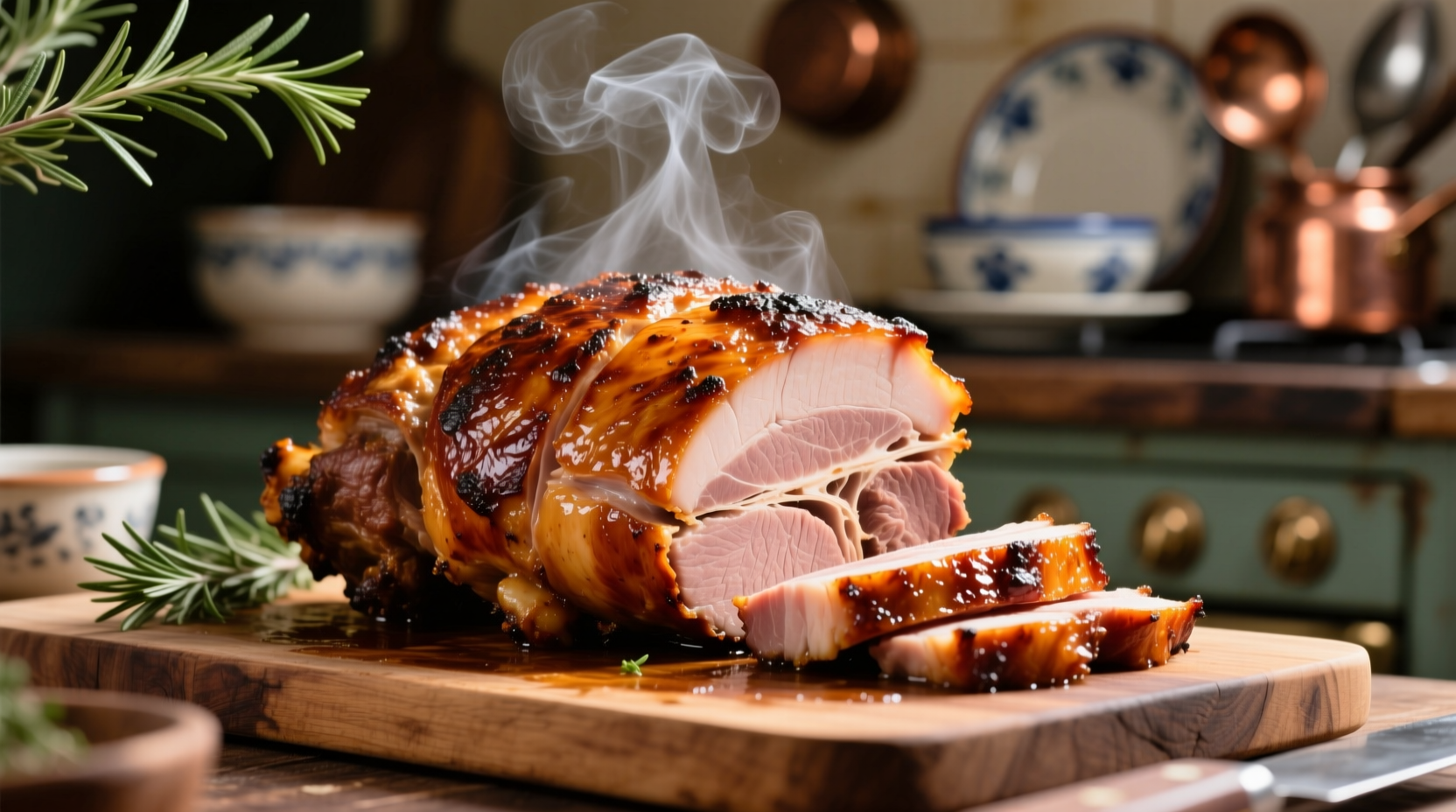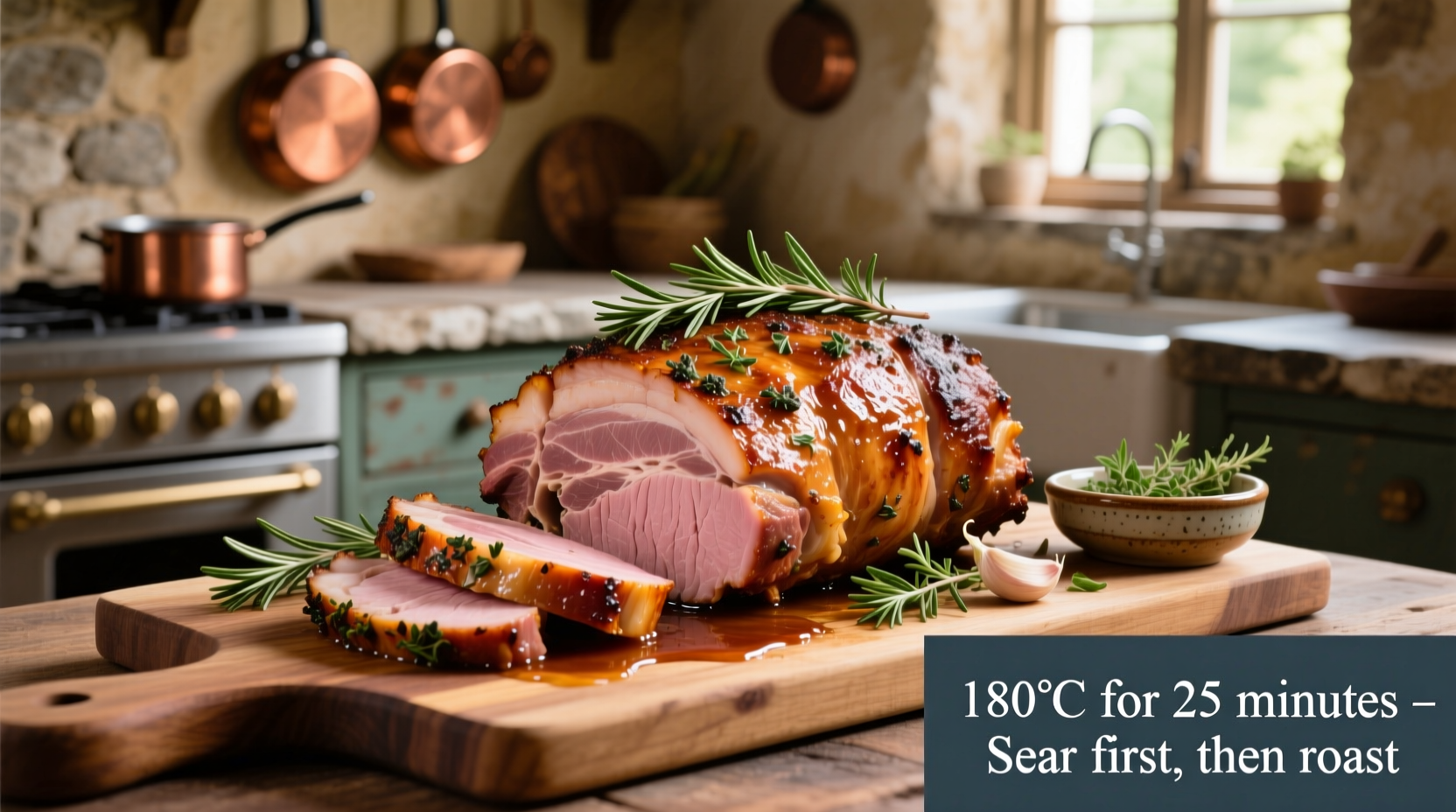Nothing beats the satisfaction of serving a beautifully roasted pork loin that's tender, juicy, and packed with flavor. Whether you're preparing a weeknight dinner or hosting a special gathering, mastering oven-roasted pork loin puts a versatile, impressive dish at your fingertips. Forget dry, overcooked meat—this guide delivers restaurant-quality results with simple techniques anyone can follow.
Why Oven-Roasted Pork Loin Works Best
Pork loin's lean composition makes precise cooking essential. Unlike tougher cuts that benefit from slow cooking, pork loin shines when roasted at moderate temperatures that cook it evenly without drying out the delicate meat. The oven's consistent heat creates a beautiful crust while maintaining moisture throughout the cut.
| Pork Cut | Best Cooking Method | Why It Works |
|---|---|---|
| Pork Loin | Oven Roasting | Moderate heat preserves moisture in lean meat |
| Pork Shoulder | Slow Roasting/Braising | Breaks down tough connective tissue |
| Pork Tenderloin | High-Heat Roasting | Quick cooking prevents drying out small cut |
Preparation: Setting Up for Success
Proper preparation makes the difference between good and exceptional pork loin. Start with these essential steps:
Selecting Your Pork Loin
Choose a center-cut pork loin roast weighing 3-5 pounds for optimal cooking. Look for:
- Pinkish-red color (avoid grayish tones)
- Thin, even layer of fat along one side
- Firm texture that springs back when pressed
Trimming and Prepping
Before seasoning, take these preparation steps:
- Pat the roast completely dry with paper towels
- Trim excess fat to 1/4-inch thickness (prevents flare-ups)
- Remove any silverskin membrane using a sharp knife
- Bring meat to room temperature (30-45 minutes)
Seasoning for Maximum Flavor
Create a simple but effective rub using pantry staples:
- 2 tablespoons olive oil
- 1½ teaspoons kosher salt
- 1 teaspoon black pepper
- 1 teaspoon garlic powder
- ½ teaspoon dried thyme or rosemary
Mix spices with oil, then massage thoroughly over entire surface of the roast. For deeper flavor, refrigerate uncovered for 4-12 hours before cooking.

The Perfect Cooking Process
Follow these precise steps for foolproof results:
Oven Setup and Roasting
- Preheat oven to 375°F (190°C) with rack in center position
- Place roast fat-side up on rack in roasting pan
- Insert oven-safe meat thermometer into thickest part
- Roast without opening oven for 20-25 minutes per pound
- Monitor internal temperature (target 140°F for carryover)
Temperature Guidelines You Can Trust
The USDA Food Safety and Inspection Service confirms that pork is safe to eat at 145°F with a 3-minute rest period. This temperature ensures both safety and optimal juiciness. According to USDA guidelines, cooking pork beyond 145°F leads to significant moisture loss.
| Weight | Approximate Time | Pull Temperature | Final Temperature |
|---|---|---|---|
| 3 pounds | 60-75 minutes | 140°F | 145°F |
| 4 pounds | 80-100 minutes | 140°F | 145°F |
| 5 pounds | 100-125 minutes | 140°F | 145°F |
Critical Resting Period
Never skip this essential step—resting allows juices to redistribute:
- Transfer roast to cutting board and tent loosely with foil
- Rest for 10 minutes (critical for juiciness)
- Temperature will rise 5-10°F during resting (carryover cooking)
- Do not cut immediately—this releases precious juices
Troubleshooting Common Issues
Even experienced cooks encounter challenges. Here's how to handle them:
Dry or Overcooked Pork Loin
This typically happens when internal temperature exceeds 150°F. To prevent:
- Use an accurate digital thermometer
- Pull roast at 140°F (it will reach 145°F during rest)
- Avoid opening oven frequently during cooking
Uneven Cooking
If one end cooks faster than the other:
- Position thinner end toward oven back (usually hotter)
- Baste with pan juices halfway through cooking
- Consider using a roasting rack for even air circulation
Lack of Crust Formation
For better browning:
- Ensure meat is completely dry before seasoning
- Preheat oven thoroughly before adding roast
- Don't overcrowd the pan with vegetables during cooking
Serving Suggestions and Variations
Elevate your perfectly cooked pork loin with these professional tips:
Simple Pan Sauce
Transform drippings into a restaurant-quality sauce:
- Remove roast and vegetables from pan
- Pour off excess fat, leaving 2 tablespoons
- Add 1 cup chicken broth and ½ cup apple cider
- Simmer 5 minutes until slightly reduced
- Whisk in 1 tablespoon cold butter for shine
Flavor Variations
Customize your seasoning profile:
- Mediterranean: Oregano, lemon zest, garlic, olive oil
- Apple Cider Glaze: Reduce 1 cup cider with 2 tbsp honey
- Spicy Rub: Paprika, cumin, cayenne, brown sugar
Perfect Pairings
Serve with complementary sides that balance flavors:
- Roasted root vegetables (carrots, parsnips, potatoes)
- Applesauce or apple chutney
- Green beans with lemon
- Wild rice pilaf











 浙公网安备
33010002000092号
浙公网安备
33010002000092号 浙B2-20120091-4
浙B2-20120091-4